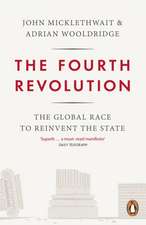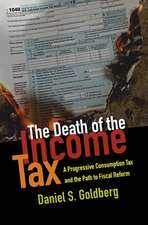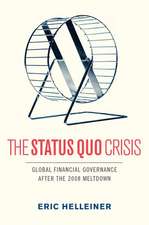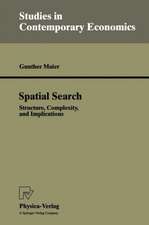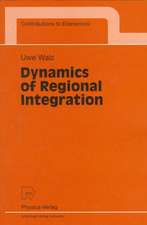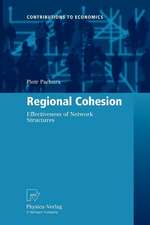Effective and Efficient Organisations?: Government Export Promotion in Germany and the UK from an Organisational Economics Perspective: Contributions to Economics
Autor Iris A. Hauswirthen Limba Engleză Paperback – 19 iul 2006
Din seria Contributions to Economics
- 18%
 Preț: 1001.81 lei
Preț: 1001.81 lei -
 Preț: 90.83 lei
Preț: 90.83 lei - 15%
 Preț: 649.06 lei
Preț: 649.06 lei - 18%
 Preț: 1109.92 lei
Preț: 1109.92 lei - 24%
 Preț: 657.06 lei
Preț: 657.06 lei - 18%
 Preț: 976.54 lei
Preț: 976.54 lei - 17%
 Preț: 361.01 lei
Preț: 361.01 lei - 18%
 Preț: 1027.83 lei
Preț: 1027.83 lei -
 Preț: 283.93 lei
Preț: 283.93 lei - 15%
 Preț: 644.95 lei
Preț: 644.95 lei - 15%
 Preț: 638.24 lei
Preț: 638.24 lei -
 Preț: 394.29 lei
Preț: 394.29 lei - 15%
 Preț: 636.80 lei
Preț: 636.80 lei - 15%
 Preț: 637.78 lei
Preț: 637.78 lei - 18%
 Preț: 723.69 lei
Preț: 723.69 lei - 15%
 Preț: 635.47 lei
Preț: 635.47 lei - 15%
 Preț: 634.00 lei
Preț: 634.00 lei -
 Preț: 392.75 lei
Preț: 392.75 lei -
 Preț: 383.33 lei
Preț: 383.33 lei - 15%
 Preț: 637.28 lei
Preț: 637.28 lei - 15%
 Preț: 636.80 lei
Preț: 636.80 lei - 18%
 Preț: 950.96 lei
Preț: 950.96 lei - 15%
 Preț: 634.68 lei
Preț: 634.68 lei -
 Preț: 387.38 lei
Preț: 387.38 lei - 15%
 Preț: 647.27 lei
Preț: 647.27 lei - 15%
 Preț: 636.63 lei
Preț: 636.63 lei - 15%
 Preț: 639.73 lei
Preț: 639.73 lei -
 Preț: 385.62 lei
Preț: 385.62 lei - 15%
 Preț: 641.85 lei
Preț: 641.85 lei - 20%
 Preț: 649.60 lei
Preț: 649.60 lei - 15%
 Preț: 641.71 lei
Preț: 641.71 lei -
 Preț: 387.96 lei
Preț: 387.96 lei - 15%
 Preț: 645.47 lei
Preț: 645.47 lei -
 Preț: 385.08 lei
Preț: 385.08 lei - 15%
 Preț: 646.62 lei
Preț: 646.62 lei -
 Preț: 383.33 lei
Preț: 383.33 lei - 15%
 Preț: 638.43 lei
Preț: 638.43 lei -
 Preț: 381.21 lei
Preț: 381.21 lei - 15%
 Preț: 642.51 lei
Preț: 642.51 lei - 15%
 Preț: 637.78 lei
Preț: 637.78 lei - 15%
 Preț: 641.71 lei
Preț: 641.71 lei -
 Preț: 384.70 lei
Preț: 384.70 lei -
 Preț: 379.86 lei
Preț: 379.86 lei -
 Preț: 378.34 lei
Preț: 378.34 lei -
 Preț: 384.70 lei
Preț: 384.70 lei -
 Preț: 388.52 lei
Preț: 388.52 lei - 15%
 Preț: 641.71 lei
Preț: 641.71 lei -
 Preț: 381.00 lei
Preț: 381.00 lei - 15%
 Preț: 644.95 lei
Preț: 644.95 lei -
 Preț: 386.00 lei
Preț: 386.00 lei
Preț: 637.59 lei
Preț vechi: 750.11 lei
-15% Nou
Puncte Express: 956
Preț estimativ în valută:
121.100€ • 127.72$ • 100.95£
121.100€ • 127.72$ • 100.95£
Carte tipărită la comandă
Livrare economică 05-19 aprilie
Preluare comenzi: 021 569.72.76
Specificații
ISBN-13: 9783790817300
ISBN-10: 3790817309
Pagini: 264
Ilustrații: XII, 252 p. 15 illus.
Dimensiuni: 156 x 234 x 17 mm
Greutate: 0.34 kg
Ediția:2006
Editura: Physica-Verlag HD
Colecția Physica
Seria Contributions to Economics
Locul publicării:Heidelberg, Germany
ISBN-10: 3790817309
Pagini: 264
Ilustrații: XII, 252 p. 15 illus.
Dimensiuni: 156 x 234 x 17 mm
Greutate: 0.34 kg
Ediția:2006
Editura: Physica-Verlag HD
Colecția Physica
Seria Contributions to Economics
Locul publicării:Heidelberg, Germany
Public țintă
ResearchCuprins
The context.- Efficient and effective organisations — Approaches in organisational economics.- Incentives, knowledge and adaptability.- The research design.- The organisation of trade fair support in Germany.- The organisation of trade fair support in the United Kingdom.- Organisation matters.
Textul de pe ultima copertă
Using organisational economics theory, the author develops a conceptual framework for analysing the effectiveness and efficiency of public services delivery. In applying the framework to case studies of export support organisations in Germany and the UK , the research establishes the causal links between organisational structures and outputs. The decisive variables are knowledge and incentives of the actors, and adaptability of the organisation. Since there are trade-offs between the variables, the findings help to explain why one organisation may be different from, but equally effective and efficient as another, and why, despite ongoing re-structuring of public and private sector organisations, no panacea for an effective and efficient organisation has been found. The analytical framework also provides a means for examining existing organisations and blueprints of future organisations, allowing for conclusions about improvability and the implications of change.

